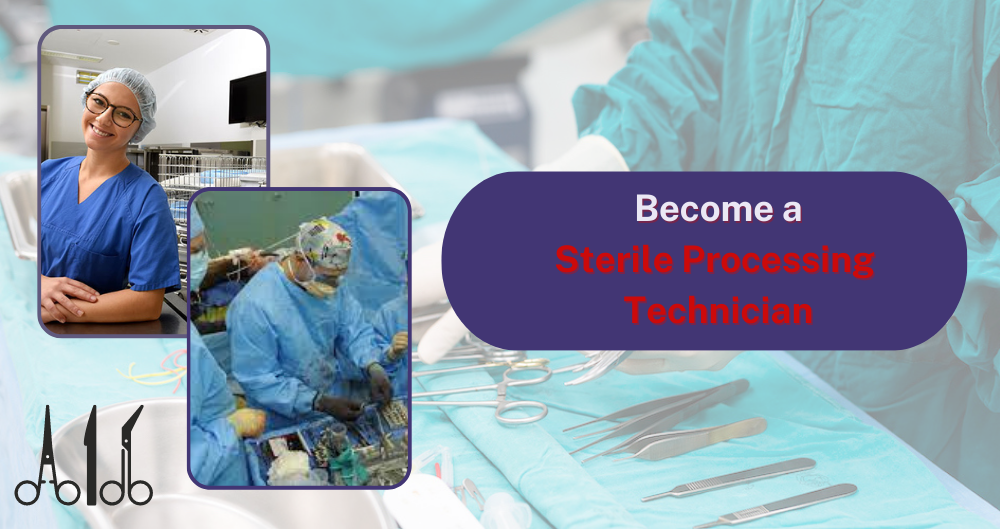What is a Sterile Processing Technician?
A Sterile Processing Technician (SPT), also known as a medical equipment preparer, is a vital cog in the healthcare industry's machinery. These professionals are responsible for ensuring that all medical instruments used in procedures are sterile and free from disease. They play a crucial role in preventing the spread of infections. Their work is instrumental in maintaining patient safety and the smooth operation of healthcare facilities.
What do Sterile Processing Technicians do?
An SPT must have a deep understanding of surgical equipment and its uses, and be able to memorize thousands of different pieces. They must build surgical trays with up to 50 different pieces, while also being aware of the surgeon's preferences and even the weight of each item.
To become an SPT, one must study microbiology, infection control, anatomy, and physiology. This means being well-versed in medical and surgical terminology.
What are the skills and qualifications of SPTs?
Becoming an SPT is an exciting career path that requires a unique set of skills. If you're interested in becoming one, you'll need to get these skills that will prepare you for this role:
-
Knowledge of sterilization techniques. You should have a comprehensive understanding of different sterilization methods. This includes steam sterilization, ethylene oxide (EO) sterilization, and low-temperature sterilization.
-
Attention to detail. Being keen on details and following protocols are essential to maintain a sterile environment.
-
Technical competence. Skill in operating various types of sterilization equipment and machinery is essential. This includes familiarity with autoclaves, ultrasonic cleaners, sterilization wraps, and chemical indicators.
-
Communication and collaboration. Effective communication and collaboration are essential when working in a team.
-
Adaptability and stress management. Working in a fast-paced healthcare environment can be demanding. You'll have extra duties such as handling biohazardous material, blood, and human tissues.
-
Organizational skills. Strong organizational skills are necessary to sort, label, and track instruments. This includes maintaining proper inventory control, ensuring timely restocking, and keeping meticulous records.
Steps to becoming a Sterile Processing Technician
If working in a surgical unit interests you, here’s a guide to being an SPT.
Step 1: Gather requirements
The first step towards becoming a Sterile Processing Technician is to understand the requirements of the role. This includes the necessary skills, qualifications, and certifications needed to perform the job effectively. A high school diploma is also not necessary for training, but it is for certifications.
Step 2: Choose a Sterile Processing Technician program
The first step in becoming a certified SPT is finding an accredited program. Some employers might need a degree, but you can start this path by earning a diploma. Here are important things you should know about this path:
- Types of Sterile Processing Technician programs: There are several types of Sterile Processing Technician programs available, including online courses, vocational schools, and community college programs. Some programs even offer free training for eligible candidates.
- Program cost: Training for this program might cost somewhere between $1,000 to $8,000, depending on the school. Some programs may also include the cost of certification exams in their tuition fees.
- Program length: The length of Sterile Processing Technician programs can range from 10 weeks to 2 years, depending on the program's intensity and availability.
Step 3: Enroll in a program
Once you have chosen a program that suits your needs, the next step is to enroll and start your training. The program will cover fundamental practices and procedures such as aseptic techniques, decontamination and sterilization of medical supplies and equipment, and HIPAA privacy regulations.
Step 4: Complete an internship
An internship provides hands-on experience and a chance to apply the knowledge and skills learned in the program. It also offers an opportunity to understand the day-to-day responsibilities of a Sterile Processing Technician.
Step 5: Select a certification and pass the exam
Some facilities may allow you to learn on the job. Yet, a certificate can provide many benefits including internships. The two main accrediting bodies that offer certification for SPTs are:
-
Healthcare Sterile Processing Association (HSPA)
-
Certification Board for Sterile Processing and Distribution (CBSPD).
Each organization offers a certification exam requiring a specific credit or experience. These certifications are valid for five years. Let's learn more about these certifications!
Healthcare Sterile Processing Association (HSPA)
This certifying body requires candidates to have 400 hours of practical experience in the following areas:
- Decontamination
- Preparing and packaging instruments
- Sterilization and disinfection
- Storage and distribution
- Quality assurance processes
- Equipment use, maintenance, and management.
Certification Board for Sterile Processing and Distribution (CBSPD)
The prerequisites for this exam vary depending on your experience and education. Candidates typically fulfill one of the following requirements:
-
Completing 12 months of full-time work as a sterile processing technician
-
Have six months of full-time experience and another six months focusing on technical work
-
Passing a sterile processing technician course with a grade of at least 70%
-
Working for 12 months in healthcare product sales related to sterile processing equipment.






